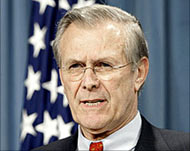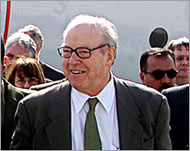Bush’s WMD claims: Error or deceit?
As the hunt for banned Iraqi weapons turns more desperate, the search for the truth about the threat they posed before the US-led invasion has become more pressing.

A majority of Americans now believe President George Bush either lied or exaggerated evidence that Iraq possessed weapons of mass destruction, according to a Washington Post-ABC News poll published on Friday.
But US Secretary of State Colin Powell, when grilled by a House of Representatives committee on Wednesday, testily denied charges that Bush had “cooked the books” or “murdered” the truth to attack Iraq.
After announcing an inquiry last week into why intelligence used to justify war now appeared so wide of the mark, Bush admitted some claims about the scope of the Iraqi threat had been wrong – but insisted his administration had invaded the country in good faith.
“I based my decision on the best intelligence possible, intelligence that had been gathered over the years, intelligence that not only our analysts thought was valid but analysts from other countries thought was valid,” he said.
We may never know beyond all doubt whether that good faith existed – because the seven-person inquiry panel has not been given the mandate to investigate the key question: Did the White House hype the intelligence to boost public support for war?
But a study of the administration’s “best intelligence” in the run up to war strongly suggests administration officials and the CIA cherry-picked what they wanted and ignored data they did not.
Controversial claims
Vice President Dick Cheney turned up the heat on Iraq and declared the administration’s intentions in August 2002. Saddam Hussein presented an immediate threat, he said, that had to be challenged directly.
“Simply stated, there is no doubt that Saddam Hussein now has weapons of mass destruction; there is no doubt that he is amassing them to use against our friends, against our allies, and against us,” Cheney declared.
 |
|
Dick Cheney: There is no doubt |
The following month, Defence Secretary Donald Rumsfeld went further and told a Congressional committee the specific nature of Saddam Hussein’s weapons of mass destruction.
“We do know that the Iraqi regime currently has chemical and biological weapons of mass destruction, and we do know they are currently pursuing nuclear weapons.”
And during a speech in Cincinnati in October, Bush himself said Saddam Hussein had a “massive stockpile” of biological weapons.
“We now know that most of the reasons we were given for going to war were wrong,” says Larry Johnson, former State Department deputy director of counter terrorism and one-time CIA analyst.
Conflicting intelligence
But on what intelligence were those claims based? A Defence Intelligence Agency report in September said “there is no reliable information” on whether Iraq still had chemical weapons (its earlier stockpile had been created with Western help).
And in October, a belatedly commissioned National Intelligence Estimate (NIE) found no “massive stockpile” of biological weapons – an absence of data that CIA director George Tenet reiterated last week.
 |
|
CIA boss George Tenet: We never |
The NIE also said Saddam Hussein did not have a nuclear weapon and alleged it would take Iraq five to seven years to produce one (if left “unchecked”). Tenet confirmed this claim last week.
Yet in December 2002, Bush told Americans: “We do not know whether or not [Hussein] has a nuclear weapon” – surely a misleading statement when his “best intelligence” had already told him Iraq was not nuclear-armed.
Moreover, Bush insisted his intelligence had uncovered a relationship between Baghdad and al-Qaida – a claim that intelligence experts reject.
“The intelligence community, including the CIA, repeatedly said there was no such relationship,” says Johnson.
None the less, as war approached, Bush suggested Saddam might arm al-Qaida with nuclear material, despite the NIE stating that this was unlikely – unless the US attacked Iraq.
“Bush has waged a campaign of deceit,” says Professor Mel Goodman, a former CIA official and senior fellow at the Center for International Policy. Goodman told Aljazeera.net the administration took an intelligence analysis that was already politicised “and made it worse”.
CIA failure
“The CIA tried to give the White House what it wanted,” says Goodman, by offering a selective assessment of Iraq’s potential threat. “But it still wasn’t good enough for the Bush administration.”
Determined to paint the war-ravaged and sanctions-battered country as a “threat of unique urgency”, neo-conservative hawks criticised the CIA for failing to support this more alarming portrayal. A dissatisfied Rumsfeld created the Pentagon’s Office of Special Plans to uncover the “evidence” required to justify war.
 |
|
Donald Rumsfeld said he knew |
Yet in a curious turnaround, the White House has recently been talking of “intelligence mistakes” that may have overstated the case for war – implying that if it had been conducted on a false premise, it was someone else’s fault: the CIA’s.
“The CIA is not free of blame,” says Johnson. “Based upon last week’s speech by Director Tenet, the CIA got it wrong on the unmanned aerial vehicles, the chemical weapons, and the biological weapons.
“However, there were footnotes and dissents in the [NIE] that would have given an honest broker pause before deciding to launch a war in Iraq.”
Powell last week admitted he did not know whether he would have recommended an invasion of Iraq if he had been told it had no stockpiles of banned weapons.
But the secretary of state and others had been told exactly that – by people with the expertise, knowledge and access necessary to make knowledgeable assessments about Iraq’s alleged WMD programme.
Evidence ignored
The problem was, White House officials did not like what the UN weapons inspectors and some of their own officials were telling them.
“The group that had the best idea of what was going on in Iraq was the UN inspection teams,” says Goodman. ” They have every right to feel proud of their work and angry at what has happened.”
 |
|
UN chief weapons inspector Hans |
Rolf Ekeus, the former executive chairman of the UN weapons inspectors, said Iraq had been verified as “fundamentally disarmed” as early as 1996.
Scott Ritter, a prominent weapons inspector till 1998, said Iraq had cooperated substantially with his team and destroyed 98% of its banned weapons by 1995. He later criticised the US for compromising the UN mission by planting spies.
More recently, Hans Blix, who headed UN weapons inspections in Iraq in the months before the US invasion, says his inspectors found no evidence of WMD or related programmes.
Meanwhile, US officials such as former ambassador Joseph Wilson and State Department intelligence analyst Greg Theilmann have publicly exposed weak or falsified claims regarding Iraq’s nuclear capability after their warnings to the administration were ignored.
Lest we forget, theirs were not the only warnings the Bush administration has apparently ignored, however. In July 2001, US intelligence produced the following alert:
“We believe that UBL [Usama bin Ladin] will launch a significant terrorist attack against US and/or Israeli interests in the coming weeks. The attack will be spectacular and designed to inflict mass casualties against US facilities or interests.”